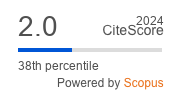Epidemiological Data, Serovar Distribution and Antimicrobial Resistance Patterns of Salmonella Species in Children, Greece 2011-2017: A Retrospective Study
DOI:
https://doi.org/10.5644/ama2006-124.315Keywords:
Salmonella, Epidemiology, Antimicrobial Resistance, Serovars, ChildrenAbstract
Objective. This study aimed to describe Salmonella epidemiology and antimicrobial resistance in Greek children over the period of 2011-2017.
Materials and Methods. A 7-year retrospective study (2011-2017) was performed, based on data recorded by the National Reference Centre for Salmonella, among children aged ≤14 years. Epidemiological data, serovar distribution and antimicrobial resistance patterns were recorded.
Results. Overall, 2347 Salmonella isolates were collected (27 typhoid-paratyphoid). Salmonellosis cases increased by almost 2-fold in 2017 compared to 2011. The highest rates were reported in August, with infants being the most vulnerable group (17.9%). The majority of isolates were identified in stool samples (91%). Boys slightly outnumbered girls (~1.05:1). Salmonella Enteritidis was the most prevalent serovar (28.5%), followed by Salmonella Typhimurium (12.2%) and Salmonella monophasic Typhimurium (10.4%). Non-typhoid isolates displayed low resistance rates to 3rd generation cephalosporins (1%) and ciprofloxacin (0.3%), while the corresponding resistance of typhoid isolates was 10% and 5% respectively. An increasing trend of Salmonella monophasic Typhimurium was recorded, associated with high rates of multidrug resistance, reaching a percentage of 97.8% in 2017.
Conclusions. Salmonellosis epidemiology in Greek children is comparable to previously published European data. Antimicrobial resistance rates to 3rd-generation cephalosporins and ciprofloxacin for non-typhoid and typhoid-paratyphoid remain low. Notably, there is an increasing prevalence of Salmonella monophasic Typhimurium isolates, associated with multiple antimicrobial resistance.
Downloads
Published
Issue
Section
License
Copyright (c) 2021 Grigoris Grivas, Theano Lagousi, Georgia Mandilara

This work is licensed under a Creative Commons Attribution-NonCommercial 4.0 International License.





